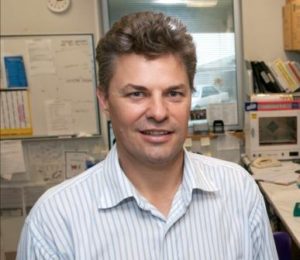 Researchers from Flinders University are looking into the past to predict whether some people in the early stages of glaucoma are likely to go blind in the future.
Researchers from Flinders University are looking into the past to predict whether some people in the early stages of glaucoma are likely to go blind in the future.
Associate Professor Jamie Craig (pictured) has just received a $956,020 grant from the National Health and Medical Research Council to conduct a significant nationwide study aimed at identifying people who are genetically at-risk of going blind from glaucoma.
Glaucoma, an eye disease which affects the optic nerve connecting the eye to the brain, is the second leading cause of blindness in Australia and usually runs in families, with fist-degree relatives of glaucoma patients having an eight-fold increased risk of developing the disease.
While it is easily preventable if caught early, most people do not have any symptoms in the early stages and therefore are not diagnosed until irreversible vision loss has occurred.
Over the next five years, Associate Professor Craig and his research team will study 1000 patients who have glaucoma in its early stages and 1000 “glaucoma suspects” Australia-wide to determine whether they are carrying a particular group of genes which are known to cause blindness.
The study builds upon his previous research in the area of genetic diagnosis, which has translated to the world’s largest national database of advanced glaucoma cases.
“When we set up the ANZRAG (Australian and New Zealand Registry of Advanced Glaucoma) we studied 1500 people who had gone blind from the disease and identified certain genetic risk profiles that were linked to blindness,” Associate Professor Craig, based in the University’s Department of Ophthalmology, said.
“Now that we’ve identified specific genes which are associated with blindness we’re going to use that information to hopefully predict whether people in the very early stages of glaucoma are going to get worse or not,” he said.
“If we can predict who’s going to go blind before they even start showing symptoms of the disease then we can treat the condition before significant vision loss has occurred.”
Associate Professor Craig said the research offered a “personalised approach to medicine” in that high-risk individuals could be targeted and prioritised.
“Better identification of those people at high risk of glaucoma, through genetic screening, would result in an overall reduction of preventable blindness by treating the condition before it’s too late.”
The study, which also involves Flinders researchers Dr Kathryn Burdon and John Landers in collaboration with researchers from Macquarie University and the University of New South Wales, has just been funded through the National Health and Medical Research Council’s 2013 funding scheme, bringing the total pool of funding awarded to Flinders to $6,215,636 across 13 projects.

